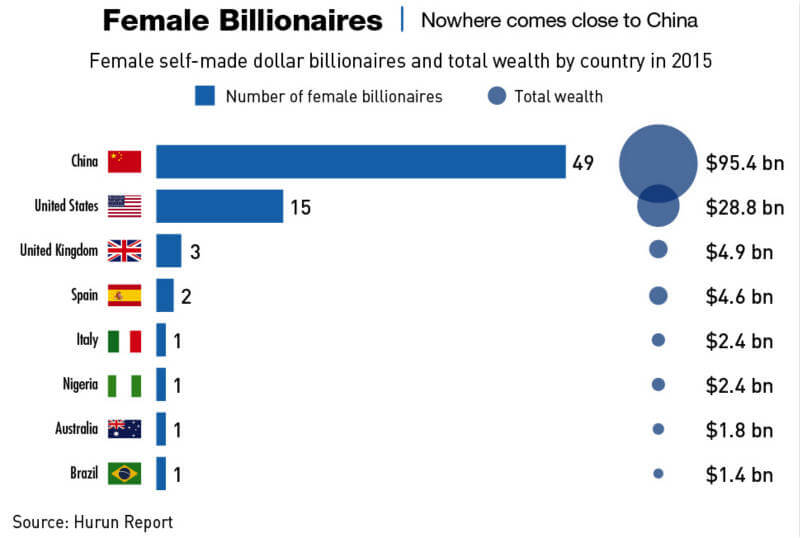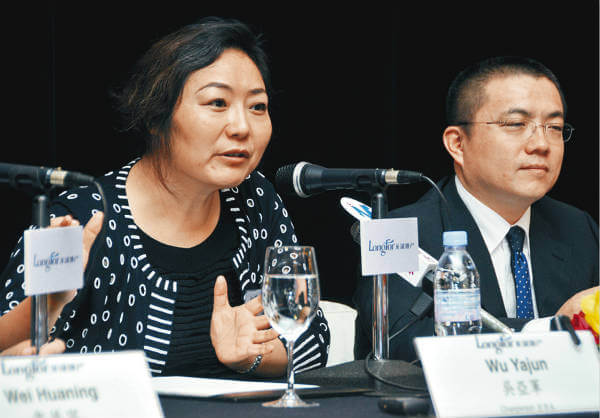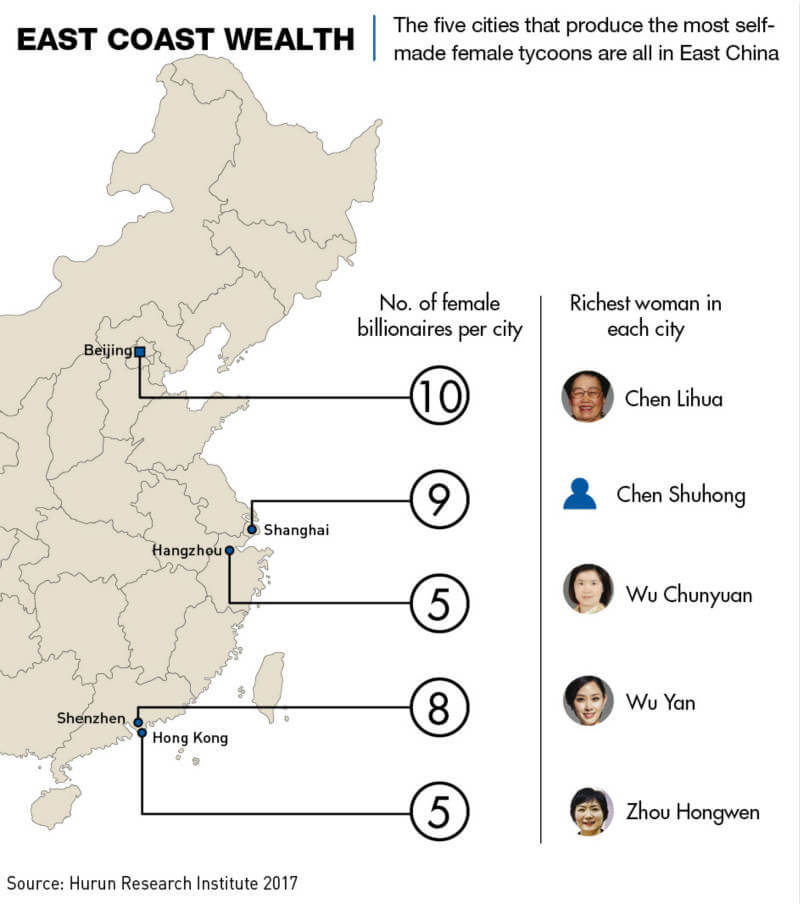
More than half of the world’s self-made female billionaires are Chinese. What sets them apart? China has the greatest number of self-made female billionaires in the world. Why are they so successful?
Wu Yajun once worked in a factory for a meagre $16 a month, but she is now one of the world’s wealthiest women, after creating a property empire worth a staggering $9.4 billion. She is one of dozens of women in China who have leveraged the economic boom of the past few decades to become very, very rich.
In fact, according to this year’s Hurun Rich List, a ranking of wealthy individuals, more than half of the world’s self-made female billionaires are Chinese. Of the 89 self-made female billionaires on the list, 57% come from China. To put that in context, China is home to only 20% of the world’s total number of women and 16% of global wealth.
Second was the United States, with 18 self-made female billionaires and the United Kingdom comes in third with six. When ranked by city, five of the top six cities for female billionaires are all in China, led by Beijing, It’s thought this has provided a boost to those cities’ economies.
“The concentration of super wealth-creating women in cities like Beijing, Shanghai and Shenzhen has a ripple effect for creating more such entrepreneurs,” said Rupert Hoogewerf, chairman and chief researcher at the Hurun Report.
When taking the massive population of nearly 1.4 billion into account, there is now one female billionaire for every 13.4 million women, which is not far off the US number of one for every 9.1 million American women.

Chart toppers
Topping the list of self-made female billionaires in the world in 2019 is the 55-year-old “Property Queen” Wu Yajun. Originally from Chongqing in the southwest and now a resident of Beijing, the billionaire spent years working in a factory and then as a newspaper reporter before establishing the real-estate development company Longfor Properties with her ex-husband. The company, which is listed on the Hong Kong stock exchange, last year reported sales of $30 billion, up 29% year-on-year, and has 20,000 employees.
Second is the 78-year-old “Beijing Real Estate Queen” Chen Lihua. She has a fortune of $7.5 billion and is best-known for owning a large chunk of downtown Beijing. Chen is an exception in that her background links her to the Manchu elite which ruled until 1911, but she was close to destitution in the early 1980s when she moved to Hong Kong. It was there that she built a diversified business empire, Fuwah International Group, originally on the basis of antique furniture trading and real estate.
“Paper Queen” Zhang Yin, aged 62, came in sixth on the global list and third in China, with $5 billion, down 28% from the year before. Her company, Nine Dragons Paper Holdings Ltd, is the largest paper maker in China and the largest producer of environmentally friendly paper in the world. It has long imported massive quantities of paper from the US to recycle as cardboard for use in packaging, and last year it bought two more integrated pulp mills in America.
“Touch-screen Queen” Zhou Qunfei, was a former factory worker from Hunan province, who now commands a workforce of about 60,000. She was last year’s number one, but has since dropped down 13 places to 14th, as her net worth plummeted 63% to $3.4 billion on the back of a share price fall.
The ingredients

China’s booming economy over the past three decades has provided opportunities to launch businesses and make money in ways that just did not exist before. And importantly the role of women in business has grown enormously.
“A lot of credit goes to China’s reform and the entrepreneurial spirit of women,” says Grace Wu, founder of the wellness industry investor WE Solutions.
“With the start of the reform and opening-up era, the economy experienced a new economic model in which entrepreneurs, both male and female, could test the waters and experiment in their own way,” says Chenni Xu, a gender consultant working with NuVoices, a media organization dedicated to promoting the work of women in the arts and media sector. “This new sphere had fewer gender constraints, than say, in the traditional home, or at the state level. So it allowed female entrepreneurs to succeed where they might not have in other areas of society.”
The extreme social disruption of the political campaigns culminating in the Cultural Revolution of the 1960s and 1970s also played a role by overturning gender-based assumptions and creating dynamics that allowed women to aspire to stand on their own and build their lives and businesses without having to defer to men. The shift from the Maoist period to the 1980s is characterized for many by the qoute from Deng Xiaoping that “to get rich is glorious.”
“A lot of them were born during the Cultural Revolution, which was a blank slate,” says Roseann Lake, author of Leftover in China, a book about the problems faced by high-achieving Chinese women. “When you’re born at such a time, you see many things are possible, that significant changes can happen, and you don’t really think that men and women are very different.”
Another factor that seems to have significantly contributed toward the number of super-rich women in China, is the one-child policy, enforced by the government from the late 1970s. The policy was abolished in 2015, but during those decades, unprecedented levels of care, attention and education were provided to only-daughters across the country because all the hopes for the future of the family rested on their shoulders.
It also chimed with the famous quote from the founder of the People’s Republic of China, Mao Zedong, who declared that “women hold up half the sky.”
“In a certain way, support for gender equality makes females relatively independent,” says Wu. “Also, the one-child policy doesn’t offer many choices to a family, therefore parents raise kids without gender differentiation and even females would receive higher education, at least in the cities.”
Claire Gerard, project leader at the market research and management consulting firm Daxue Consulting, says the sudden rise of self-made female billionaires in the world’s second-largest economy can be largely explained by societal and economic factors, which have helped to give women better prospects in business management than in the West.
“The past decades of evolution in the economy has influenced education and family structure at a very fast pace,” she says. “These factors have led to a fast empowerment of businesswomen, that may have been different in Western countries, where women leadership and influence in their personal life is not that developed.”
China’s constitution guarantees women “equal rights with men in all spheres of life,” and over the last decades, women have enjoyed notable gains. Life expectancy and literacy rates, for instance, have risen as the economy has developed, although this progress has to some extent been outpaced by the rest of the world.
“In terms of women in the workplace, China places higher than other East Asian countries such as Japan or South Korea, but that doesn’t mean there is gender equality in all areas of society,” says Xu “That being said, Chinese women are encouraged and expected to join the workforce, and do so in droves. The problem is in the ‘leaky pipeline.’ The number of women at entry level jobs is above 50%, and slowly declines as they rise up through the ranks to less than 1% representation at the board level. This is a structural issue that needs the input of all those involved, not just women, to make a difference in advancement and opportunities that women receive.”
“Instead of saying society is more gender-balanced, I’d rather say that Chinese society provides more flexibility for women to develop,” says Vivian Miao, manager at a leading travel company. “As long as women are prepared when chance favors them, we will have the opportunity to stand on this stage.”

Shared traits
China’s rich women tend to share certain characteristics—they mostly come from hard-working backgrounds rather than the elite class, and they are strongly independent-minded in a society that is still largely male-dominated.
“They are fearless and they speak their mind,” says NuVoice’s Xu. “They are similar to any ‘self-made man’ except it was probably much harder for them, considering the externalities they had to face in their journey to the top.”
“They tend to be motivated by the pull of great opportunities, to start younger, are better-educated and not afraid to fail,” adds Wu from WE Solutions. “Their tolerance, sensitivity and attention to detail are advantages when it comes to operating a huge business.”
There is also a strong correlation between female billionaire numbers and booming property markets—property development is at the heart of most of China’s wealth today, based on the usage-rights lease arrangement which started only in the early 1990s, although all property is actually owned by the state.
The property market growth across the country over the past two decades and more provided an opportunity for women to lead and prosper that other industries did not. The finance sphere is largely owned by, or closely integrated with, the government, mostly has men in leading positions, and as in the West, the movers and shakers in the tech world tend to be men.
“Women in China always had some power and influence. Even when they were taking care of the household, they were managing budgets or making decisions for the family,” says Gerard. “They are used to being in charge in their personal lives, and so they’ve applied the same power and leadership dynamic to their professional lives.”
Another common feature of female billionaires and Chinese business leaders generally is their ability to manage risk, says Miao. “The difference is that women naturally are more careful when it comes to risk, and tend to be more practical and detailed-driven than male counterparts,” she says.
“It’s difficult to generalize, as each individual is different, but women are amazing multi-taskers and can hold a lot on their plate while attaching great importance to responsibility,” says Xu. “For risk-taking, it might be more prudent for there to be more balance, taking into consideration the types of financial crises that have occurred in the past 20 years.”
Grace Wu from WE Solutions, however, sees female billionaires as being just as willing to take risks and entrepreneurial leaps into the unknown. “In the past it was ‘Necessity Entrepreneurship’ while now it is ‘Opportunity Entrepreneurship,’ but I don’t think there is [any] difference in the way that female billionaires handle risk and responsibility.”
Wu Yajun, co-founder of Longfor Properties, certainly doesn’t lack nerve. She made her money from property and that is where most of her wealth is still held, but her private wealth management company Wu Capital, is reported to be aggressively investing in technology companies including Uber and Evernote.
Onward and upward
The likelihood is that women are going to play an ever-greater role in the economy and society in the future, but at what point will the power structure change to reflect the growing economic power of women in the country? Only one member of the 25-member Politburo, the top body of the ruling Communist Party, is currently a woman, and the leadership of the state-owned enterprises which dominate large sections of the economy is overwhelmingly male. “Historically, leaders were soldiers, and the military is not really a gender-balanced environment,” says Wu. “In the Union Nations ranking of women in politics in 2019, China only came 73rd among 193 countries. Improvement has been slow and I don’t expect much of it to change.”
“There is definitely a trend of female involvement in high-level business in China that I believe will continue,” says Xu. “That’s a no-brainer. As Christine Lagarde [Chairman of the International Monetary Fund] pointed out, this is an opportunity for growth for everyone as well as the economy. What needs to be discussed is the double work duty that women have at home. Men have long since had a ‘subsidy’ in the form of an at-home worker in childrearing and caretaking.”
But the world of business provides a freedom and flexibility for women that politics lacks, and the female billionaires of today are in the vanguard of a much wider engagement by women in the economy.
“Trends in education have also seen women attend university in increasing numbers with many courses now having a higher ratio of women than men,” says Gerard. “Reaching a gender-balanced society still need decades, but women are working hard on this and powerful business women are having a great impact on this transformation.”
Female involvement in high-level business will increase in the future,” adds Gerard. “We have already seen fast growth and Chinese women are hard working, ambitious and want to be successful. They have gained independence in their lifestyle and successful women are role models for many other women in the cities.”
The example set by China’s female billionaires has a huge potential impact on society, Gerard says. “The societal and economical environment is evolving much faster than in Western countries, and the potential for women to be involved in business is increasing. Women have seen other women succeeding, and starting young and from scratch, they are willing to follow the same path and are not afraid to take risks.”

















